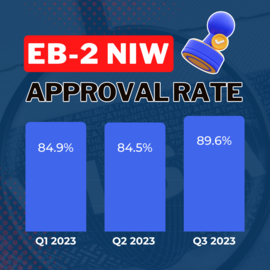Visas
EB-2 visa category
The EB-2 visa is designed for U.S. professionals with advanced degrees or exceptional abilities, presenting three subcategories: EB-2(A) for individuals with exceptional skills, EB-2(B) for those holding advanced degrees, and EB-2(C) for a waiver of job offer and labor certification when work is deemed to be in the national interest.


What is an EB-2 visa?
The EB-2 is an immigrant visa preference category for the United States employment-based permanent residency, created by the Immigration Act of 1990. It includes professionals with advanced degrees or individuals with exceptional ability in the sciences, arts, or business whose work benefits the national economy, cultural or educational interests, or overall welfare of the United States. While most EB-2 applicants require employer sponsorship, those applying under the National Interest Waiver (NIW) can self-petition, meaning they do not need a job offer or labor certification.
USCIS evaluates NIW petitions based on whether the applicant’s proposed endeavor has substantial merit and national importance, and whether they are well-positioned to advance their field in a way that benefits the country. Recent updates to policy guidance clarify how USCIS assesses these factors, particularly for advanced degree professionals and individuals of exceptional ability, ensuring that petitions align with the evolving economic, scientific, and technological needs of the United States.
There are three categories for the EB-2 visa
EB-2(A): Advanced degree professionals
The EB-2 (A) visa category is designed for highly skilled professionals whose work requires an advanced degree (master’s or higher) or its equivalent, which means a bachelor’s degree plus at least five years of progressive, post-bachelor’s work experience.
To qualify, the applicant’s education and experience must directly relate to their proposed work in the United States. USCIS clarifies that simply holding an advanced degree is insufficient—the degree must be relevant to the endeavor. For example, an engineer with a Ph.D. in AI research is a strong candidate, whereas an engineer opening a bakery does not meet the eligibility criteria.
Additionally, USCIS evaluates five years of post-bachelor’s experience on a case-by-case basis, ensuring it is progressive and directly related to the field of study. Understanding these requirements is essential for a successful EB-2 visa petition under the advanced degree professionals category.
EB-2(B): Exceptional ability
For professionals without an advanced degree, the EB-2 (B) visa category allows individuals with exceptional ability in the sciences, arts, or business to qualify. Exceptional ability means having expertise significantly above the norm, demonstrated by professional recognition, industry contributions, or leadership roles.
Recent USCIS updates emphasize that exceptional ability must be directly connected to the applicant’s proposed work in the U.S. Immigration officers assess whether the skills, experience, and industry reputation align with the intended endeavor. This ensures that professionals genuinely contribute to national interest.
For example, a cybersecurity expert with breakthrough AI research is a strong EB-2 candidate. However, a computer scientist moving into organic farming, may struggle to show how their exceptional ability is relevant to the proposed work.
EB-2(C): National interest waiver (NIW)
The National Interest Waiver (NIW) allows individuals to apply for a green card without a job offer or labor certification, provided their work has substantial merit and national importance. This means the applicant’s contributions extend beyond a single employer and benefit the U.S. economy, technology, public health, or other key areas.
USCIS has clarified what qualifies as "national importance." While all professions contribute to society, an NIW petition must show a broad impact, beyond filing a labor shortage. For example, a university professor developing AI policy may qualify, as their work influences national research and policy-making. However, general K-12 teachers may not qualify unless they demonstrate a broader contribution, such as curriculum innovation or education policy leadership.
Main requirements of the EB-2 NIW visa

How to apply for the EB-2 NIW visa
Ready to secure your EB-2 NIW visa?
Are you curious about how we can guide you through the process of obtaining your EB-2 National Interest Waiver (NIW) visa? Take the next step towards realizing your American dream by exploring our Green card for top talent solution page. Here, you'll gain insights into our meticulous process, transparent pricing, and browse through sample cases. Discover everything you need, from gathering essential documents to effectively justifying your National Interest Waiver.
Documentation to present

The ascending trajectory of the EB-2 NIW visa program
As of Fiscal Year 2023, the United States Citizenship and Immigration Services (USCIS) has provided insights into the National Interest Waiver (NIW) petitions in the first three quarters. In the first quarter, a total of 8,806 NIW petitions were submitted, with an impressive 84.9% approval rate, resulting in 7,622 approved petitions.
Moving into the second quarter, 7,889 applications were received, and the landscape shifted with 9,119 approvals, 1,710 denials, and 15,825 pending applications, yielding an approval rate of 84.5%.
However, the third quarter witnessed an improvement, boasting an elevated approval rate of 89.6%. These statistics offer a dynamic overview of the evolving trends in EB2 NIW adjudications throughout the fiscal year, reflecting the nuanced processes and outcomes within the immigration landscape.
*Information extracted from travel.state.gov
Interested in discovering more about our services?
EB-2 NIW processing time
For Form I-140, the processing time can take anywhere from 10.5 to 26.5 months, depending on where the applicant is filing from. After the applicant receives a notice of approval, they will then need to check the U.S. Department of State’s Visa Bulletin to see whether a green card is available.
Once a visa becomes available, the applicant may initiate the green card application process. If applying from within the United States, they will need to submit Form I-485. However, it's important to note that significant processing backlogs exist, and these can significantly impact the timeline for obtaining permanent residency.
Relatives of the EB-2 NIW visa holder

Derivative status for family members
While the primary focus of the EB-2 NIW is the individual beneficiary, the spouse and unmarried children under 21 years of age can be included in the immigration process as derivative beneficiaries. This means that they can accompany the principal applicant to the United States and obtain green cards based on the primary applicant's NIW.
Eligibility for work authorization
Once in the United States, the spouse of the EB-2 NIW beneficiary may be eligible to apply for work authorization through the U.S. Citizenship and Immigration Services (USCIS). This allows them to legally work in the United States during the processing of their green card application.
Access to education
Children accompanying the primary beneficiary can access education in the United States, and they may qualify for certain benefits available to the dependents of employment-based immigrants.
Benefits of the EB-2 NIW visa:

EB-2 NIW premium processing
Premium processing is a service offered by the U.S. Citizenship and Immigration Services (USCIS) that expedites the adjudication of certain immigration petitions, providing a faster processing timeline for applicants.
As of the latest available information, for those applying for the EB-2 NIW (National Interest Waiver) visa using Form I-140, individuals have the option to request premium processing for a fee of $2,500. All pending and future petitions will be evaluated under the updated USCIS criteria, ensuring applicants demonstrate strong alignment between their qualifications, proposed endeavor, and national interest.
By opting for premium processing, applicants can expect a decision on their Form I-140 within 15 calendar days, significantly accelerating the overall processing time.





